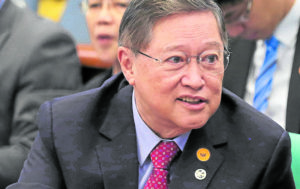
Finance Sec. Carlos “Sonny” Dominguez PHOTO BY JOAN BONDOC
MANILA, Philippines—Finance Secretary Carlos Dominguez III on Wednesday said the COVID-19 vaccines bought by the government through loans obtained from multilateral banks had been above board.
Speaking at the Kapihan sa Manila Bay forum, Dominguez noted that himself, Health Secretary Francisco Duque III and vaccine czar Secretary Carlito Galvez Jr. had been tasked by President Duterte to oversee vaccine purchases.
As such, the government decided to borrow from the Manila-based Asian Development Bank (ADB), the Beijing-based Asian Infrastructure Investment Bank (AIIB), as well as the Washington-based World Bank so that these three lenders can directly pay vaccine suppliers.
To recall, these institutions extended a total of $1.2 billion in loans to the Philippines in March for the nationwide mass vaccination program.
“We chose to finance our vaccine procurement from the multilateral agencies… because we wanted to assure the public that there is no overpricing. World Bank, AIIB and ADB will not finance anything that smells of overpricing. And believe me, they see the prices around the world; they know the prices to other countries, which we do not know,” Dominguez said, referring to the nondisclosure agreements signed with the global pharmaceutical giants.
“They definitely will not lend us any money if they suspect that there is any hint of corruption. So we designed this [financing] program that way to assure the public, and especially the legislature, that when we cannot disclose the prices because of nondisclosure agreements, we have a seal of good housekeeping from these agencies,” Dominguez said.
Dominguez clarified that the Philippine government does not acquire vaccines from foreign governments, although some countries donated vaccine shots to the Philippines like China, France, Japan, Poland, and the United States, among others. The Finance chief said that while the Philippines bought from China’s Sinovac, Russia’s Sputnik, and US-based vaccine manufacturers, the government dealt with private firms and not foreign governments. For instance, Sinovac vaccine doses were purchased through the ADB loan, he noted.
This month of December, the Philippines was scheduled to be the recipient of three more loans, this time to buy boosters and pediatric shots — $300 million from the World Bank, plus $250 million each from the AIIB and the ADB.
Dominguez noted that of the P396 billion set aside in the proposed P5-trillion 2022 national budget, P45 billion in unprogrammed funds were intended to buy booster shots for all Filipinos covered by the expanded vaccination program, including children.
Unprogrammed appropriations came either from borrowings like the multilateral loans or excess revenues, which the government does not have yet as the pandemic-induced economic slump badly hit revenue collection.
“The program for next year will really be to vaccinate all Filipinos, and also to provide booster shots for everyone who has been vaccinated,” Dominguez said.
Since the onset of the COVID-19 pandemic in March last year up to the present, the government borrowed a total of $23.4 billion from foreign lenders and offshore commercial markets, Dominguez said.
Of these external borrowings for COVID-19 response, the bulk or $21-billion worth were injected into the national budget to finance bigger expenditures amid a prolonged fight against the pandemic as well as fill the gap made by weak tax and non-tax revenues, he said.
To date, $19.8 billion of these budgetary support financing were already disbursed to the government, he added.
Dominguez said the bulk of funds obtained from foreign sources had been spent on vaccines.
As for the remaining $2.4 billion in loans and grants given away by multilateral lenders and bilateral development partners, Dominguez said these funds had been contracted for specific COVID-19 response projects being implemented by the Department of Health (DOH). So far, half of the amount of these project loans and grants were disbursed.
“These projects include the procurement of laboratory equipment, medical supplies, and vaccines, as well as interventions that will address the impact of the pandemic on poor communities.
These are being implemented by the relevant agencies involved in our pandemic response,” said Dominguez, who heads President Duterte’s economic team.
In a separate statement on Wednesday, the Department of Finance (DOF) said Dominguez told the Bangko Sentral ng Pilipinas’ (BSP) Monetary Board that the national government will repay its P540-billion zero-interest, short-term loan on Dec. 10, ahead of the maturity on Jan. 12 next year.
Dominguez, who represents President Duterte in the board serving as the BSP’s highest policy-making body, also said that for next year, the national government requested lower P300-billion liquidity support from the central bank amid improving prospects as a result of reopening more economic sectors.
“We have seen economic recovery already begin to take root as more businesses embark on a safe reopening with the successful rollout of the government’s mass vaccination program. The extension of a new P300-billion provisional advances will ensure sufficient resources for the government to safeguard this promising but still fragile recovery,” Dominguez told BSP Governor Benjamin Diokno in a Dec. 1 letter.
“Funds granted under this short-term lending arrangement are not used for direct financing of government operations but serve as a liquidity gap measure that ensures the government will be able to undertake large spending in advance of anticipated revenue collections or regular borrowing proceeds,” the DOF noted.
The DOF said National Treasurer Rosalia de Leon had “recommended that the P300-billion advances be fully repaid before the end of June 2022 to fully unwind the liquidity support before the start of the next administration.” The forthcoming borrowings from the BSP will still have a three-month maturity period, with three months of extension if needed.
De Leon had also recommended the earlier repayment “on the basis of favorable cash position brought about by promising revenue collections and overwhelming support in the recent retail treasury bond (RTB) offering,” the DOF said.
The government’s end-October tax and non-tax revenues grew 5 percent year-on-year to P2.49 trillion, while the Treasury raised P360 billion from 5.5-year RTBs this month.